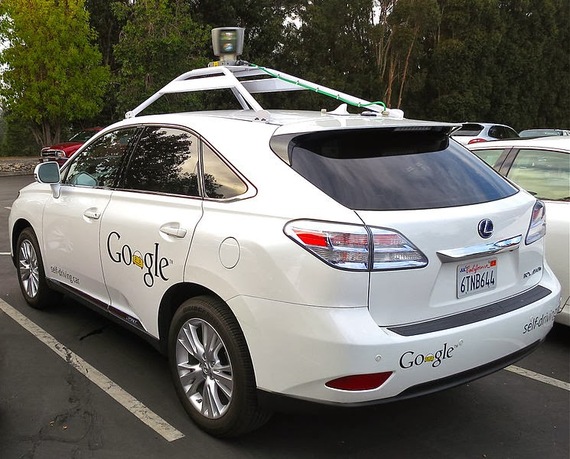 In an interview in Foreign Affairs, Google's Sebastian Thrun talks about driverless cars ("Google's Original X-Man," November/December 2013). Thrun remarks,
In an interview in Foreign Affairs, Google's Sebastian Thrun talks about driverless cars ("Google's Original X-Man," November/December 2013). Thrun remarks,
"If you look at the twentieth century, the car has transformed society more than pretty much any other invention. But cars today are vastly unsafe. It's estimated that more than a million people die every years because of traffic accidents. And driving cars consumes immense amounts of time...if the car could drive itself, you could be much safer...cars could come to you when you need them; you wouldn't have to have private car ownership."
Of course the car is like Manifest Destiny. It's the symbol both of individualization and of the American dream. One's first car is a rite of passage. The concept of the driverless car is a quid pro quo in which individuality is traded in for expediency. Highways are turned into the equivalent of tarmacs with cars transformed into pods whose movement is dictated by the equivalent of air traffic control. Traffic jams are non-existent since the thermodynamics of viscosity would constantly be mediated by a computer. Of course, along with individuality, privacy would also be sacrificed, since each car or pod would now be a piece of data whose movements were constantly tracked.The driverless car is a concept in robotics. And the real subject is the kind of advanced artificial intelligence that can produce a robot which not only regurgitates the data that's programmed into it, but which, according to Thrun, can also learn. But the implications are vast. Computers have already proven their superiority to men in everything from math to chess. And when a computer takes on a task and proves its superiority, it leads to the attrition of the concomitant faculty in the human, whether it's long division or writing or even reading. However, what happens when cybernetics intrudes into even higher level thought? What's the difference between governing a country and driving a car? The computer will have the cards stacked in its favor. It will know how to push everyone's buttons since it installed at least the technologically created ones. And what about the integrity of the self in this mix? Human life might be spared by the driverless car, but what ultimately is the destiny of the solitary mind in a world in which the objects of man's creation rule him by way of a world wide web.
photo: Steve Jurvelson
{This was originally posted to The Screaming Pope, Francis Levy's blog or rants and reactions to contemporary politics, art and culture}